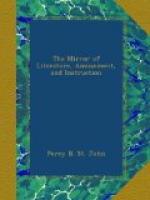“But, sir, you have not breakfasted.”
“Oh, never mind breakfast.”
“You know, sir, when you go out fasting you have such spasms——.”
“My shoes, I tell you.”
“And then you complain of your stomach.”
“I shall have no want of a stomach again all my life. Never any more—no, never—ruined.”
“Ruined—Jesu—Maria! Is it possible? Ah! sir, run then,—run—.”
Whilst the Cure dressed himself in haste, and, impatient to buckle the strap, could scarcely put on his shoes, Moiselet, in a most lamentable tone, told him what he had seen.
“Are you sure of it?” said the Cure, perhaps they did not take all.”
“Ah, sir, God grant it, but I had not courage enough to look.”
They went together towards the old barn, when they found that the spoliation had been complete. Reflecting on the extent of his loss, the Cure nearly fell to the ground. Moiselet was in a most pitiable state; the dear man afflicted himself more than if the loss had been his own. It was terrific to hear his sighs and groans. This was the result of love to one’s neighbour. M. Senard little thought how great was the desolation at Livry. What was his despair on receiving the news of the event! In Paris the police is the providence of people who have lost any thing. The first idea, and the most natural one, that occurred to M. Senard was, that the robbery had been committed by the Cossacks, and, in such a case, the police could not avail him materially; but M. Senard took care not to suspect the Cossacks.
One Monday when I was in the office of M. Henry, I saw one of those little abrupt, brisk men enter, who, at the first glance, we are convinced are interested and distrustful: it was M. Senard, who briefly related his mishap, and concluded by saying, that he had strong suspicions of Moiselet. M. Henry thought also that he was the author of the robbery, and I agreed with both. “It is very well,” he said, “but still our opinion is only founded on conjecture, and if Moiselet keeps his own counsel we shall have no chance of convicting him. It will be impossible.”
“Impossible!” cried M. Senard, “what will become of me? No, no, I shall not vainly implore your succour. Do not you know all? can you not do all when you choose? My diamonds! my poor diamonds! I will give one hundred thousand francs to get them back again.”
[Vidocq promises to recover the jewels, and the jeweller offers him 10,000 francs.]
In spite of successive abatements of M. Senard, in proportion as he believed the discovery probable, I promised to exert every effort in my power to effect the desired result. But before any thing could be undertaken, it was necessary that a formal complaint should be made; and M. Senard and the Cure, thereupon, went to Pontoise, and the declaration being consequently made, and the robbery stated, Moiselet was taken up and interrogated. They tried every means to make




